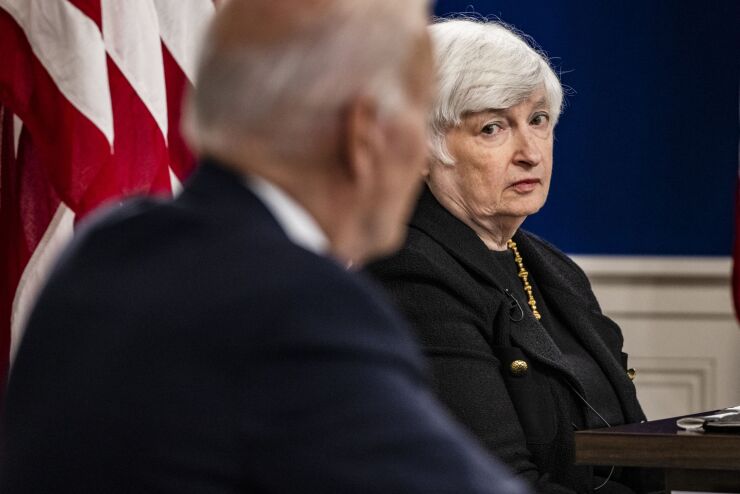WASHINGTON — Democrats launched an attempt Tuesday to strike a compromise over a highly contentious bank reporting measure, but critics of the plan do not appear to be giving an inch.
The Treasury Department and Democratic senators officially announced a modified proposal to require banks to submit customer account flow information to the Internal Revenue Service. The plan is seen as a way to catch tax evaders and raise revenue for President Biden's Build Back Better agenda.
The revisions include raising the reporting threshold to $10,000 in annual account flows from $600, and exempting wages and federal benefits such as Social Security from the calculation of the threshold, according to a Treasury fact sheet.
The changes reflect the "strong belief that we should zero in on those at the top of the income scale who don’t pay the taxes they owe, while protecting American workers by setting the bank account threshold at $10,000 and providing an exemption for wage earners like teachers and firefighters,” Treasury Secretary Janet Yellen said in a statement.
The new plan appears aimed at

While centrists remained silent about the plan Tuesday, Republicans and banking industry representatives blasted the proposed changes as insufficient. Critics of the measure say it will expose bank customers to privacy intrusions and be a compliance nightmare, although the administration claims opponents are spreading misinformation.
"The exclusion of payroll and federal program beneficiaries does not address millions of other taxpayers who would be impacted by the proposal," American Bankers Association CEO Rob Nichols said in a statement. "Given the IRS’s own recent history, the privacy and data security concerns for Americans are real and should not be taken lightly. That is why Americans across the country have expressed their strong opposition to this proposal."
The new IRS reporting regime is seen as a centerpiece of a Biden priority to crack down on tax avoidance. Despite narrowing the proposal, the Treasury Department said in the fact sheet published Tuesday that it estimated the plan would generate $700 billion in additional tax revenues over the next 10 years.
Treasury also said that “audit rates will not rise relative to recent years for any taxpayer who makes less than $400,000 annually.”
The concessions come after several weeks of heavy opposition to the plan from banks, credit unions and Republican lawmakers, who have complained about the risks of government surveillance and regulatory burden for financial institutions.
GOP senators hosted a press conference Tuesday afternoon further deriding the plan, even with its most recent modifications.
“Yeah, this is a breathtakingly bad idea,” said Sen. Pat Toomey, R-Pa., and ranking member on the Senate Banking Committee. “This proposal is going to affect almost every single American. Not just the average American.”
Much of the press conference was dedicated to hammering the IRS, with Republicans arguing their constituents had no reason to trust the federal tax authority after years of high-profile cybersecurity attacks and privacy breaches.
“I hear from people all around Wyoming that the IRS is already the least accountable and most powerful agency of the government,” said Sen. John Barrasso, R-Wyo. “They point out that the IRS is incapable of keeping their records … private, as they should be.”
The Republican senators made clear that their resistance to the plan would not abate with higher reporting thresholds — even a threshold as high as $100,000. “Even if that threshold were to be raised as some have intimated, say to $100,000, that still would sweep in more than half of Hoosier households,” said Sen. Todd Young, R-Ind.
Taking questions from reporters, Sen. Mike Crapo, R-Idaho, said that he recognized the existence of a "tax gap" and that more should be done to crack down on tax evasion.
“There are things that we could do to address the tax gap,” Crapo said, suggesting a more concentrated focus on upgrading the IRS’s technological and customer service capabilities. “I don't think creating this dragnet is the way to approach it,” he said.
Crapo also dismissed the Treasury Department’s concession to exempt wage earnings and federal benefits from the IRS reporting threshold calculation.
“I'm pretty sure they're gonna spend some of that income and hit the $10,000 threshold, and then they're pulled into the game,” Crapo said.
But Democrats on Capitol Hill who support the proposal were adamant that the brunt of the plan would be felt by high earners — particularly business leaders with opaque revenue streams — who have avoided paying their fair share of taxes.
"Working people pay their taxes voluntarily because they know their employer is sending their numbers to the IRS. The wealthy business owner, on the other hand, is on an honor system," said Sen. Ron Wyden, D-Ore., during a press call Tuesday afternoon.
On that same call, Sen. Elizabeth Warren, D-Mass., took aim at the nation's largest banks, accusing their lobbyists of "fighting against our proposal that would help the IRS sniff out the hidden cash of banks' wealthiest clients when they cheat on their taxes."
Warren also echoed complaints made by the Treasury Department in recent days, accusing banks and their political allies of misrepresenting the scope of the reporting requirements under consideration.
"Banks and their wealthy clients are outright lying about this proposal, claiming that it would give the IRS information on individual transactions," Warren said, "and many Republicans are backing them up to satisfy their corporate and wealthy donors."





